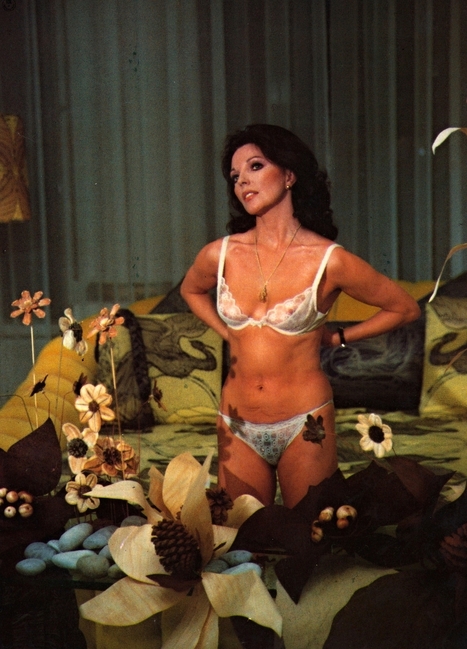I've made it my mission to hunt down and watch all of Dame Joan Collins's pre-Dynasty cult films. From crime dramas to horror to erotic thrillers, she starred in some delightfully trashy flicks in the 1970s and early 1980s, and I'm going to watch them all. So, consider Dame Joan—or, as I like to call her, Joan Fucking Collins—numero uno on the list of reasons why I recently streamed Poliziotto senza paura, a 1978 Italian film set in Vienna and directed by Stelvio Massi. Various international titles include Magnum Cop, Fearless, Fearless Fuzz, and Fatal Charm. IMDb describes the plot like so: "An Italian private investigator tries to get to the bottom of a suspicious kidnapping case with the help of an exotic dancer." I like to describe it as a combination police procedural/screwball comedy/erotic thriller. The dubbing into English is hilariously bad, leaving many characters sounding like stand up comics delivering punchlines to jokes they never told in the first place.
Maurizio Merli stars as Walter Spada, the Italian private dick trying to solve the case of a missing girl in Vienna, which quickly leads him down a rabbit hole of sex and intrigue. Merli was one of the most prominent actors of the Italo-crime subgenre, starring in close to a dozen of them. He's outrageously good in Magnum Cop, playing a charming and wisecracking gumshoe who's always on the prowl for some action—police action, sure, but mostly female action. Watching him flirt with a beautiful bartender and talk his way into drinking on the house is absurdly entertaining.
Joan doesn't appear until the forty minute mark, but she makes it well worth the wait. Playing stripper/exotic dancer Brigitte, she struts out on stage, puffs seductively on a cigarette, and then launches into her act. After that, she flirts, slinks, and screws her way through the rest of the film. Turns out she's involved in the child prostitution case, helping lure young teen girls into a life of sexual squalor. Her complicity is never quite clear, however, thanks to the film's convoluted nature.
Spada confronts Brigitte with her accomplice crimes, then instructs her to strip naked for...reasons? Reasons like this, maybe: she's Joan Fucking Collins and her sex bomb status is what sells this movie. She happily obliges, smiling coyly as she undresses slowly for maximum effect—Brigitte is a professional, after all. Soon enough Spada is slowly sliding his gun down her naked body. Before Spada can slap on the cuffs—or slap on the cuffs and boff the always game Brigitte into submission as I suspect was his plan—a mystery gunman fires, killing Brigitte instantly. So long, Brigitte, we hardly knew ye. Turns out it was the old codger behind the kidnappings, who later blames it all on Brigitte and her explosive sexuality for corrupting his morals. Way to take personal responsibility, man.
The film's Wikipedia entry offers the sort of passionate (if at times grammatically awkward) defense of Joan's 1970s films that I might make:
Despite doing the occasional film in Italy and various made-for-TV movies, the exposure was enough to essentially relaunch Joan as a viable Star and lead to many other career opportunities. While some dismiss these movies as schlock, often Joan's performance in them lifts the material from mundane to eminatley [sic] viewable, if only to see her age-defying Beauty.
Fatal Charm is one such movie where the sum of its parts is exceeded by the end result. Not Academy award winning material but adequate to pass a Sunday afternoon enjoyably.
That's the key: Joan's 1970s work ultimately stands as a glorious testament to her otherworldly beauty, style, and glamour. Whenever she graces the screen in these films, be it Tales From the Crypt or I Don't Want to Be Born or The Stud, she immediately makes them required viewing. Magnum Cop is another classic Joan performance that delivers exactly what you expect out of her 1970s output: she's deliciously haughty, slyly funny, stunningly gorgeous, and quite often in her skivvies. When she isn't naked, of course.




Joan is a diamond. I've never heard of Magnum Cop, but it sounds right up my alley. The Bitch and The Stud were a hot topic when I was at school and we would fast forward to the good bits on the VHS tapes. Though I don't think I've ever seen them all the way through. The first time I saw La Collins was in Tales of the Unexpected. It left a lasting impression on this young man.
ReplyDeleteI too have only seen parts of The Bitch and The Stud, but they're high on my list to see in full, soon (and, uh, I guess that also includes seeing Joan "in full" too). They've both gotten pretty new Blu-ray releases in the last year or so, so I've been tempted to order them both. I've never seen Tales of the Unexpected but now I must hunt it down! Magnum Cop is a lot of fun. The tonal shifts, from the drama surrounding the seedy sex ring to the weird silly bits of comedy is almost whiplash-inducing. Joan is simply marvelous throughout.
Delete